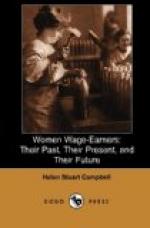[45] Our Toiling Children. By Florence Kelley, W.C.T.U. Publishing Association, Chicago.
[46] Married Women in Factories. By W. Stanley Jevons, Contemporary Review, vol. xli. pp. 37-53.
[47] Miss Alice Woodbridge, Secretary of the Working-Woman’s Society, 27 Clinton Place, New York.
[48] The association then formed, and from which much is hoped, made the following summary of its objects:—
“The objects of this Association shall be: 1. To awaken the public mind to the importance of establishing a Bureau of Information where there can be an exchange of wants and needs between employer and employed in every department of home and social life. 2. To promote among members of the Association a more scientific knowledge of the economic value of various foods and fuels; a more intelligent understanding of correct plumbing and drainage in our homes, as well as need for pure water and good light in a sanitarily built house. 3. To secure skilled labor in every department of women’s work in our homes,—not only to demand better trained cooks and waitresses, but to consider the importance of meeting the increasing demand for those competent to do plain sewing and mending.”
XII.
REMEDIES AND SUGGESTIONS.
The student of social problems who faces the misery of the lowest order of worker, and the sharp privation endured by many even of the better class, is apt, in the first fever of amazement and indignation, to feel that some instant force must be brought to bear, and justice secured, though the heavens fall. It is this sense of the struggle of humanity out of which have been born Utopias of every order, from the “Republic” of Plato to the dream in “Looking Backward.” Not one of these can be spared; and that they exist and find a following larger and larger, is the surest evidence of the soul at the bottom of each. But for those who take the question as a whole, who see how slow has been the process of evolution, and how impossible it is to hasten one step of the unfolding that humankind is still to know, it is the ethical side that comes uppermost, and that first demands consideration.
Taking the mass of the lowest order of workers at all points, the first aim of any effort intended for their benefit is to disentangle the individual from the mass. It is not charity that is to do this. “Homes” of every variety open their doors; but in all of them still lurks the suspicion of charity; and even when this has no active formulation in the worker’s mind, there is still the underlying sense of the essential injustice of withholding with one hand just pay, and with the other proffering a substitute, in a charity which is to reflect credit on the giver and demand gratitude from the receiver. Here and there this is recognized, and within a short time has been emphasized by a woman whose name is associated with the work of organized charities throughout the country,—Mrs. Josephine Shaw Lowell. It is doubtful if there is any woman in the country better fitted, by long experience and almost matchless common-sense, to speak authoritatively. She writes:—




